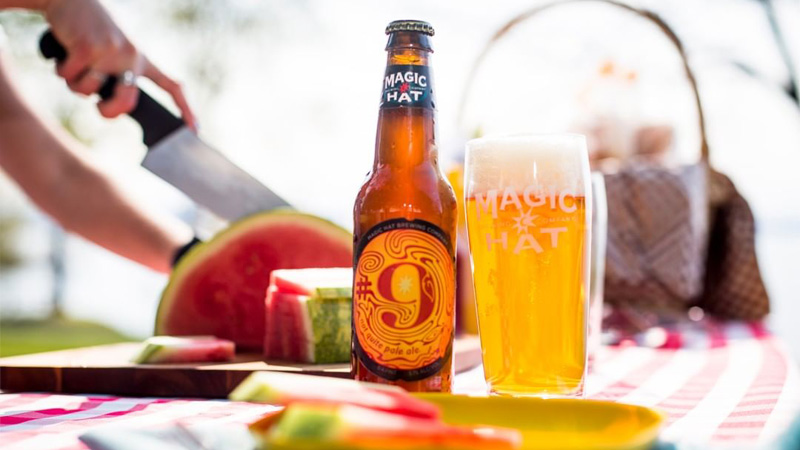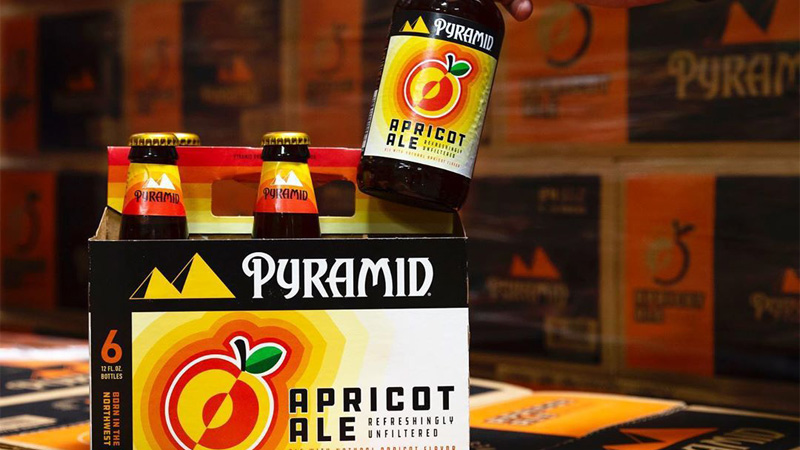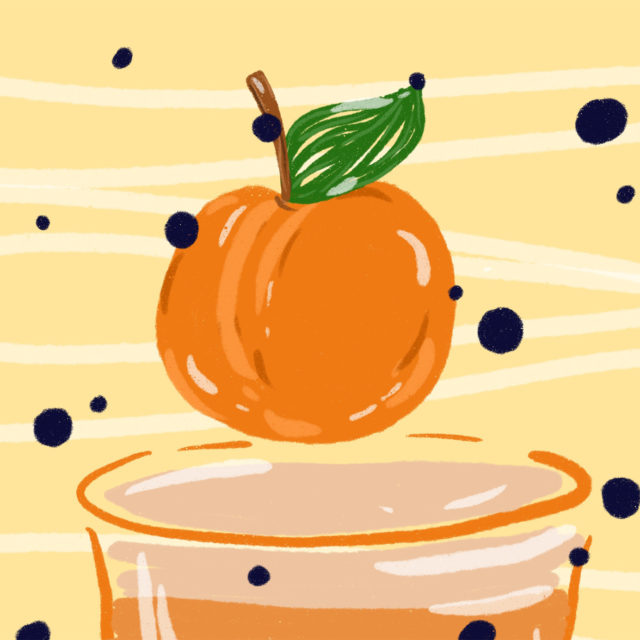Times are tough for everyone during this ongoing pandemic and breweries certainly aren’t exempt. In mid-June, in fact, came the shocking news that Magic Hat Brewing would be closing up its decades-old South Burlington facility; opened in 1994, it was one of the pioneers of the craft beer revolution, a brewery that jump- started the Vermont scene that is now perhaps the best in the world. By 2011, Magic Hat had become the eighth-largest craft brewery in America, its dynasty built mainly by a beer simply called #9, almost amorphous stylistically. Even today the brewery describes it as “not quite a pale ale,” with its key flavor produced by apricots.
Magic Hat #9’s meteoric ascent hearkens back to a time when it was, oddly, apricot beer that kind of built 1990s craft brewing and turned it mainstream.
“#9 was the source of my nightmares for many years,” jokes Schuyler Blackman, the head of imagination and formulation relations at Magic Hat, though he’s referring to the fact that he had worked for competitor Harpoon during #9’s heyday.
Don't Miss A Drop
Get the latest in beer, wine, and cocktail culture sent straight to your inbox.Magic Hat was co-founded in 1994 by Alan Newman, a serial entrepreneur who had also created the eco-friendly company Seventh Generation in 1988. With his friend Bob Johnson, who was already a home brewer, they decided to start a brewery; this was a time when America was in the nascent days of craft beer’s emergence. The West Coast was still the epicenter of craft brewing then and Newman and Johnson headed out there to scope out the scene and hopefully get inspired. If most breweries of the time were built around ambers, lagers, and pale ales, the Vermont duo was intrigued when they wandered into Pyramid Brewing Co., and found that one of its bestsellers was an apricot beer.
“West Coast brewers were always about five years ahead of East Coast brewers when it came to innovation,” says Newman in his book “High on Business: The Life, Times, and Lessons of a Serial Entrepreneur.”
Once known as Hart Brewing, co-founder husband and wife Beth Hartwell and Tom Baune had little brewing knowledge when they launched the brand in Kalama, Wash., in 1984. By the time they’d moved their base of operations to downtown Seattle a decade later, their Pyramid Ales were garnering plenty of attention — especially the Apricot Wheat summer seasonal.
“Fruit-flavored wheat beers were very much the rage and Bob and I thought we could keep Magic Hat ahead of the pack if we developed a fruit beer,” says Newman. The only issue was that Newman detested the fruit beers of the time — things like Pete’s Wicked Ale Strawberry Blond and Sam Adams’ Cherry Wheat — finding them way too sweet.
Plus, they had a stigma attached to them. “Back in the late ’80s and early ’90s, as craft brewing was just taking root, these beers were disparaged as ‘chick beers,’” explains longtime Portland beer writer Jeff Alworth. “They seemed suspicious, as if harboring an innate femininity men feared. They were also, of course, light and uninteresting, more reasons to shun them.”

Wheat beers had become a thing in the Pacific Northwest in the early 1990s, a good style for “weaning” people off Budweiser and onto craft beer. Pyramid had five wheat beers, including Wheaton Ale and an unfiltered hefeweizen. In early 1994 it added all-natural apricot extract to the hefeweizen and created Apricot Wheat. It was an immediate hit and Pyramid had no choice but to make it a year-round option. The beer was quickly accounting for 25 percent of sales and would go on to win a gold medal at 1994’s Great American Beer Festival in Denver.
“I don’t know why apricot was the flavor that captured people’s attention,” says Ryan Pappe, Pyramid Brewing’s head brewer. Pappe suspects an apricot ale was a lot more singular in 1994 than it would be today. “I think we’ve become a little bit affected by the flood of beer available now and certain beers don’t stick out like they used to,” he says.
Still, it’s not like apricot is a particularly popular fruit, now or then, not even in the Top 20 most popular fruits in America. It’s not a fruit unique to the Pacific Northwest, either; certainly not as beloved locally as apples, pears, cherries, and berries.
“Maybe that’s the appeal of it,” suggests Pappe. “Everyone knows apricot, but they don’t really know it. I haven’t been to an apricot orchard. I don’t usually buy them whole. I get dried apricots for snacking, or for baking. Apricot is familiar to us but also a mystery.”
Magic Hat, for one, would seize on that mystery aspect of the fruit when designing #9. Johnson actually thought it best to downplay the use of apricot and just make it an interesting note in their pale ale.
“I always thought they [Pyramid] used too much apricot,” says Johnson, who claims he mostly wanted to highlight its white fruit aroma and delicate nuance. He also liked that Pyramid was the only other brewery using apricots. This apricot essence — essentially an extract that adds mostly aroma, but little flavor — was never mentioned in marketing materials until recently, though it, along with the muted hop character, would make the beer a little sweeter than the expected pale ale. Still, it wasn’t an “apricot beer” like Pyramid Apricot Wheat; it was merely a beer that had apricot in it.
“It’s funny for me to even do this interview because, for the longest long time, up until the last few years, we wouldn’t even talk about apricot, or what’s in the beer,” says Blackman. “It’s supposed to be a mystery, as is the name. Is it Revolution #9? Love Potion #9? That’s what made it so successful.” (In later years, Johnson would admit it was named after the Fiat X1/9 roadster.)
Still, as someone just getting into drinking craft beer during the late-’90s and early-2000s, I can tell you: Even if it didn’t say there was apricot in Magic Hat #9, everybody knew. How could we not? The beer was once as ubiquitous of tap handle as anything in the industry, a mainstay of chain restaurants drafts well into the 2010s. And, brewing-wise, at least, imitators would follow, trying to capitalize on this lightning in a bottle that would allow #9 to show double-digit growth every year from 1995 to 2010.
There was Ithaca Apricot Wheat, Lost Coast Apricot Wheat, Big John’s Apricot Wheat, Dry Dock Apricot Blond, and Sea Dog Apricot. When I first moved to New York City in 2001, bus stop and phone booth advertisements for local chain brewpub Heartland Brewery’s Summertime Apricot Ale were ubiquitous, the visage of a young woman holding a bushel basket of the fruit.
In the spring of 2004, the most zeitgeisty brewery of the moment, Delaware’s Dogfish Head, released the first bottles of Aprihop, turbo-charging the idea of what apricot beers could be. (A draft-only version had appeared as early as 1997.) Not a wheat beer but instead a massively-hopped IPA, its flavor came not from apricot essence, but actual apricot juice. This was far from Alworth’s derided “light and uninteresting” fruit beers, checking in at 7 percent ABV, and loaded with a resinous, bitter quality.
“I wanted to do a nice hoppy IPA but put a culinary thumbprint on it,” says Sam Calagione, Dogfish Head’s founder. He went to the internet, trying to figure out what fruit might pair well with the high myrcene (essential oil) levels inherent in the de rigeur Pacific Northwest hop varietals of the time, like Cascade and Amarillo. He found a few fruits that might fit the bill, adding each to the same IPA base on his small, five-barrel brewing system. “When I finally tried apricot it was a magical, kismet moment.”
As the aughts were coming to an end, the industry was radically changing. Stylistically, wheat beers and fruity ales were going out of style as bitter and sour styles began to reign. While business-wise, conglomerates were snapping up these once small mom-and-pop breweries, in 2008, Independent Brewers United, Magic Hat’s parent company, even bought Pyramid, its initial inspiration. Newman left in 2010 and since 2012 Magic Hat has been part of the brewery conglomerate FIFCO USA.
Back in Portland, however, Ron Gansberg was experimenting with apricots as the head brewer at Raccoon Lodge. He’d go down to the Columbia River Gorge to buy apricots, bringing them back to the brewery where he added them whole fruit, sometimes even using the meat from the shells, to his tripel before barrel-aging it. That turned the beer tart and wild and led to his Cascade Apricot Ale — a bellwether for things to come.
“It has the aroma not only of fresh apricots, but that intense scent [of] fresh fruit, warmed by the summer sun, vents off,” wrote Alworth, who honored it as 2008’s beer of the year, noting, “An amazing beer, both approachable yet complex.”
Other publications would salute this iconoclastic beer as well, like Draft Magazine, which named it a Top 25 beer of 2008, writing, “Cascade’s Apricot Ale takes fruit beer to a whole new level: It’s like opening a bottle of freshly packaged apricots. … This is everything a masterfully crafted fruit beer should be.”

Suddenly, a fruity wheat beer seemed incredibly passé, and though beers like #9, Pyramid Apricot Ale, and many of the other pioneering apricot beers would continue to exist, if the fruit was being used in the 2010s, it was now being used in sour beers and being used as either whole fruit or purée. By 2013, the highest-ranked fruit beer on Beer Advocate’s Top 100 list was Cantillon’s Fou’ Foune at No. 11 — it was an apricot lambic.
“Apricot is a pretty weak flavor, something that doesn’t yield the strong, fruit-forward flavor that folks want in their hugely fruited beers these days,” says Gage Seigel, founder and brewer at Brooklyn’s Non Sequitur Beer Project. He produces a Dogs Can Look Up, a sour IPA — a uniquely modern style — by adding apricot purée to more potent fruits like pineapple and lime. “Your guess is as good as mine why they opted for apricot specifically [in the 1990s], maybe it’s exoticism?”
And, yet, if Magic Hat #9 is hardly exotic these days, it’s still firmly entrenched in today’s craft brewing zeitgeist. In 2018, another Vermont brewery, Hermit Thrush, took Magic Hat #9 wort, trucked it to its brewery, and put it into a foeder along with fresh apricot purée. First released in May of last year, Sour #9 was a hit, introducing a whole new audience to the wonders and mysteries of both Magic Hat #9 and the one fruit that may have mainstreamed the entire craft beer renaissance.
“Apricot to me is incredibly relevant because our wild yeast here in Brattleboro produces the flavor by itself, without any fruit additions,” says Christophe Gagne, Hermit Thrush’s brewmaster. “It’s this balance, this context, that makes apricot so fascinating to utilize as an ingredient.”
